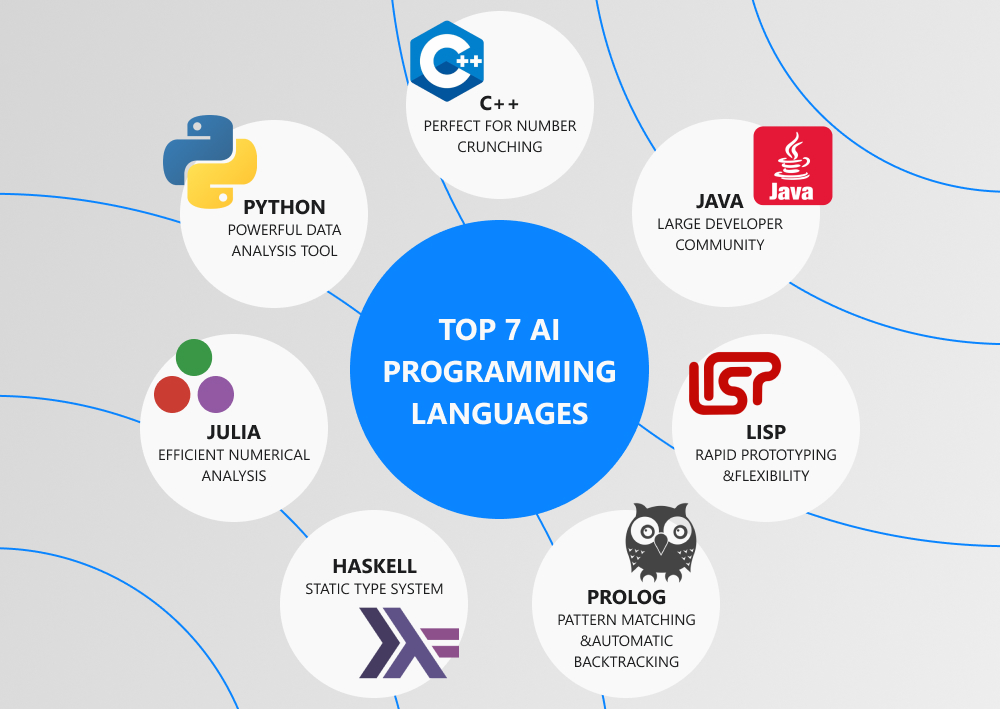Today, people don't view machine learning and artificial intelligence as odd and frightening anymore. So, if you've ever employed Siri, Tesla Autopilot, or just a chatbot in your banking app, it means AI-powered solutions have already entered your life. And while neural networks and robots keep conquering the modern world, it’s essential to follow the innovations and understand how they work. At this point, let's define the best language for artificial intelligence.
Since there are many programming languages for AI development, we've pinpointed the relevant features of the most efficient ones. So, keep reading the article to find your perfect AI language.
written by:
Anton Rykov
Product Manager
Contents
Top 7 AI Programming Languages
#1. Python
Developed in 1991, even before AI became crucial to business, Python has turned into a major choice for customized AI solutions. Actually, it's the third widely used language in machine learning, NLP, and neural network connections, so it stands out among other AI programming languages. Since Python is a powerful data analysis tool considered efficient within the big data field, it's prevalent in the AI development industry. So, let's have a closer look at its pros and cons.
Pros
- easy to learn
- fast prototyping
- simple syntax guarantees faster development and facilitates testing
- an extensive set of ready-to-use libraries (TensorFlow, NLTK, Scikit-learn, PyTorch)
- readable English keywords
- huge open-source community support
- great flexibility makes Python a platform-independent language that easily integrates with other languages
Cons
- it's an interpreted scripting language, so the speed of development can be relatively low
- not perfect for mobile app development
#2. C++
C++ is an extension of the C language and has been in use since 1979. This AI programming language serves mainly for building complex automated products like banking software, cloud systems, e-learning software, and enterprise software. Also, its extensive libraries are ideal for high-performance applications, ranking, faster mathematical calculations, and SEO optimization. While developers choose Python for high-level programming, precompiled C++ remains a perfect option for the crunching of numbers.
Pros
- one of the fastest AI programming languages with a high processing speed
- its flexibility makes it perfect for resource-intensive applications
- cost-efficient
Cons
- limited range of libraries
- no support for garbage collection
- its complex syntax makes project development time-consuming
#3. Java
Java is perfect for object-oriented programming and scalability in AI projects, making it the most widely used programming language globally. It's standard and flexible and includes Java Virtual Machine Technology, which eases the entire implementation process. Also, the Java Machine Learning Library is employed both for projects based on neural networks and machine learning algorithms. Taken all together, these features make Java one of the best programming languages for artificial intelligence.
Below, you'll find some other crucial characteristics of Java.
Pros
- easy-to-use syntax
- simple debugging protocols
- a built-in garbage collector
- open-source frameworks and libraries (Deep Java Library, TensorFlow, OpenNLP)
- perfect for large-scale projects
- can be implemented in any domain, not just Data Science
Cons
- its low processing speed increases response time
#4. Lisp
Famous for its rapid prototyping, Lisp (or list processing) was created in 1958 by John McCarthy, and nowadays, it's considered the oldest AI programming language. Initially, Lisp was developed to conduct scientific research and prove theorems, but later it turned into an excellent option for AI programming development. And by the way, it's John McCarthy who introduced the term "artificial intelligence".
Lisp is renowned for effective specific problem-solving. Also, this AI programming language has impacted the creation of other languages like R and Julia. Lisp's competitive edge consists in quick adaptation to solutions; that's why it's frequently used for machine learning. So, let's compare its benefits and disadvantages.
Pros
- rapid prototyping
- use of recursion instead of iteration
- flexibility
- uniformity
- dynamic object creation
Cons
- strange syntax
- lack of well-known frameworks and libraries
#5. Prolog
Have you ever heard of the first chatbot ELIZA? So, Prolog is an AI programming language used for its creation. Its name stands for "programming in logic", and it's one of the oldest programming languages. Prolog relies on pattern matching and automatic backtracking and is mainly used for Natural Language Processing.
Prolog is a declarative AI language completely designed by logic. To create an AI solution with Prolog, developers must provide end goals, facts, and queries. Another feature you should know about Prolog is that it can generate code in Java, C#, and Ruby. But although it's somewhat flexible and powerful, not every programmer chooses it for AI development.
Pros
- list handling allows experimenting with algorithms that involve lists
- recursion-based search engine
- high efficiency due to backtracking and data structuring
Cons
- the graphics are not supported
- poor structure
- not easily readable
#6. Haskell
Type safety is what makes Haskell different from other popular programming languages for artificial intelligence. Also, since Haskell resolves errors during the compilation process, it offers excellent flexibility. Another feature you should know is that this programming language is based on expressive algorithms and abstract mathematics, and it is famous for its static type system.
Pros
- easy to understand
- it's one of the safest languages for AI
- high efficiency in resolving errors
- support of embedded domain-specific languages
- code reuse
Cons
- small community support
#7. Julia
Another programming language for artificial intelligence you've probably come across is Julia. Developed in 2009, Julia quickly became known as a general-purpose AI language designed for computational science and numerical analysis. In fact, since Julia is considered a dynamic type language created to eliminate flaws of other AI programming languages, it abounds in valuable features.
Pros
- in-built package manager
- both native and non-native libraries
- multiple dispatch support
- dynamic type system
- high speed and productivity
Cons
- small community support
Which AI Language Is Perfect for You?
Such a competitive edge as AI-powered tools allows advanced companies to cut staff and reduce compliance costs, which leads to increased revenues and enhanced customer experience. Since it can open up numerous opportunities for all businesses, artificial intelligence will definitely remain the trendsetter in the field. And the fact that developers can choose any programming language to create AI software only proves this point.
But how to choose the best programming language for AI and enhance your business? The truth is, there is no single multipurpose AI language, and much depends on your expectations and requirements. Thus, Java is famous for mobile application development, Prolog is mostly used for voice assistants and chatbots, and Python is rather efficient when it comes to task automation. So, keep this in mind while choosing a perfect language for AI.
Please, contact our specialists if you want to know more about AI programming languages. Qulix Systems is an experienced AI software development company that is ready to offer you quality customer service.

Contacts
Feel free to get in touch with us! Use this contact form for an ASAP response.
Call us at +44 781 135 1374
E-mail us at request@qulix.com







